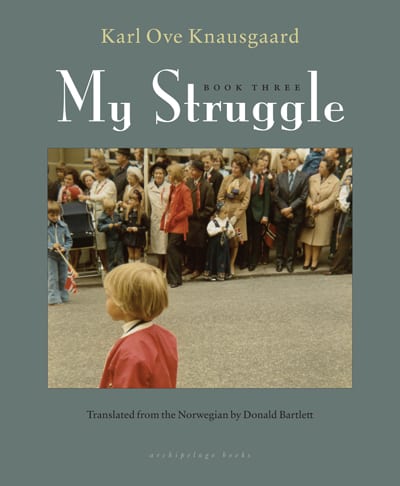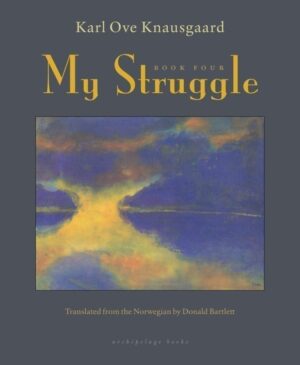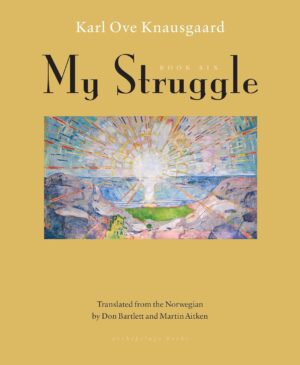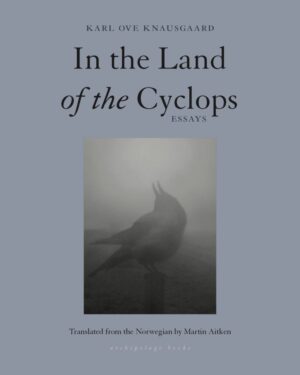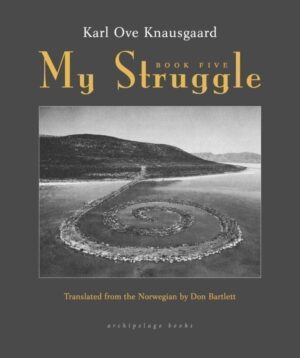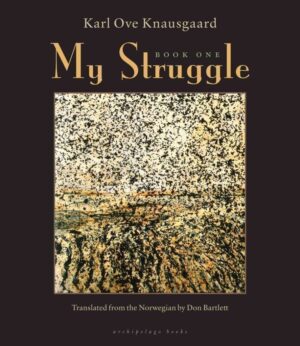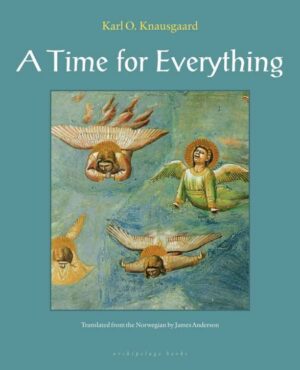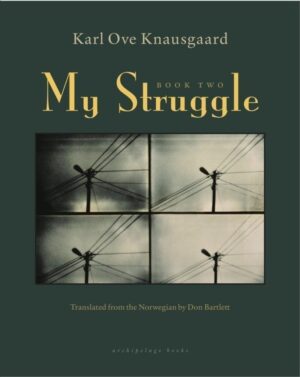What’s notable is Karl Ove’s ability, rare these days, to be fully present in and mindful of his own existence. Every detail is put down without apparent vanity or decoration, as if the writing and the living are happening simultaneously. There shouldn’t be anything remarkable about any of it except for the fact that it immerses you totally. You live his life with him.
— Zadie Smith, New York Review of Books
Knausgaard . . . strips away the literary tricks, bursts through language, explodes artifice . . . Honest and wise . . . rare properties in contemporary writing . . . Book Two sears the reader because Knausgaard is a passionate idealist and not just a tetchy complainer. He wants to create great art, and he wants to fight the conformity and homogeneity of modern bourgeois existence.
— James Wood, The New Yorker
...My Struggle is a revolutionary novel that is highly approachable, even thrilling to read. The book feels like a masterpiece—one of those genuinely surprising works that alters the tradition it inherited.
— Meghan O'Rourke, Bookforum
The ever-present threat of Karl Ove’s father provides an engrossing source of tension,...and Knausgaard skillfully recreates the point of view of a child. This segment of a genre-defying and unusual novel will leave readers hungry for the following installments, and serves as a fine entry point into the series.
— Publishers Weekly (Starred Review)
Halfway through, this series is starting to look like an early-21st-century masterpiece.
— Kirkus Reviews (Starred)
This deserves to be called perhaps the most significant literary enterprise of our times.
— Rachel Cusk, The Guardian
Boyhood, so little given to evaluation, assessment, or argumentation, is instead a study of immersion. It is a pure-state immersion: not immersion in something, not a study of something, but immersion per se. With a nod to Roland Barthes’s dream of a language returned to its simplest, Adamic roots, we might call this immersion degree zero, a similarly paradisiacal (or childlike) fantasy. It is the function of the novel as a genre stripped to its barest essential. Little in Boyhood is allowed to get in the way of that goal. Not the prose, which in Don Bartlett’s translation is as swift and unornamented and unmannered as possible, as if aiming for pure continuation and sequence, as if driven by an almost childlike desire to keep moving to the next thing. Not the narrative rhythm, in which the sheer mass of a few random childhood days exerts a gravitational pull that distends and stretches into a time almost equivalent to the time of reading itself...Glistening surfaces, constantly in the act of opening up—and always, as a result, transfixing.
— Nicholas Dames, Public Books
While not unconcerned with finding objective truth in the moments he recounts, Mr. Knausgaard aims first to simply record them, to try to shape the banal into something worth remembering. Beautifully rendered and, at times, painfully observant, his book does a superlative job of finding that "inner core of human existence." If his first volume was his struggle to cope with death, this is his struggle to cope with life.
— Brian P. Kelly, The Wall Street Journal
My Struggle is unexpectedly entrancing—the combination of detail and intimacy creates an illusion of being inside somebody else’s brain...My Struggle is worth the, uh, struggle.
— GQ
The book kept me up till two almost every morning for a week . . . Real and singleminded in his storytelling. I don’t read Norwegian, but it’s hard to believe that the translator, Don Bartlett, could have made such vital, humane prose—over such a long stretch—unless he was hewing close to a work of genius.
— Lorin Stein, The Paris Review
Steadily absorbing, lit up by pages of startling insight and harrowing honesty, My Struggle introduces into world literature a singular character and immerses us in his fascinating Underground Man consciousness.
— Philip Lopate
...free-form, fear-filled, densely descriptive…Norway’s biggest literary star since Ibsen
— Leo Robson, New Statesmen (UK)
My Struggle is already the most significant literary achievement of the 21st century and we still have three volumes to go.
— Sunday Express (UK)
The locations and details may be unique, but it is Knausgaard’s gift to make of this unsparing specificity something universal.
— The Times (UK)
The second volume surpasses the first in original ideas about society and love and childhood and friendship. Karl Ove—with his shyness, his passion, his honesty—can take on any subject and make it his own.
— Edmund White
... his relentless self-disclosure manages to be immersive rather than boring. It’s a kind of self-negating narcissism that gives us license to explore our own lives in a similar level of detail. [...] If we’re obsessed with Knausgaard, it’s because we’re ultimately obsessed with ourselves—he gives us an excuse for navel-gazing, and we worship him for it.
— Kyle Chayka, The Baffler
The argument in this death of the essay essay is false but [rings] true. Like crying real tears at a convenient moment to avoid trouble but out of genuine sadness. I've been reading My Struggle by Karl Knausgaard which confronts this problem head-on. It's devastating. There is nothing the New Republic (or Slate) can run that could have this kind of effect on literature....one of the larger [literary] debates...is the debate of memoir vs. fiction. And Knausgaard fire bombs that entire conversation into the 18th century.
— Stephen Elliott, The Rumpus
...With each subsequent book of his that is translated into English, Mr. Knausgaard continues to solidify his reputation as one of the most vital writers working today.
— The Observer (UK)
Both Knausgaard’s Proustian style and the fact that his work is one long book stretched out into many volumes, just like In Search of Lost Time, should signal that it’s a literary event the likes of which we probably will not see again in our lifetimes...Unlike almost every other work of art released in the 21st century, Knausgaard’s massive book is an ongoing cultural event that we’re being afforded the opportunity to savor.
— Jason Diamond, Flavorwire
Between Proust and the woods. Like granite; precise and forceful. More real than reality.
— La Repubblica (Italy)
A rope round the neck, a knife in the heart. The book is full of magic. The world simply opens up ... Knausgaard will have the same status as Henrik Ibsen and Knut Hamsun.
— Kristeligt Dagblad (Denmark)
[Knausgaard's] preternatural facility for description, the dreamy thickness of his prose, speaks not only to the sheer pleasure his fiction affords, but to the philosophical stakes of that pleasure.
— Mark Sussman, Los Angeles Review of Books
His work ranks as one of the most memorable reading experiences of my life. There has been, for me, nothing quite like it. Karl Ove makes me see better. I have not wanted his books to end because I have not wanted to unmerge with him. He writes of longing to be back in “the maniacal, the lonely, the happy place” he achieved while writing. In my own maniacal, lonely happiness, away from the world for a time, away from the human pull, I found comfort in knowing that, despite his deep craving for distance and work, Knausgaard remains loyal to the human world, to being open to what it offers.
— Nina MacLaughlin, The LA Review of Books
A masterpiece of staggering originality, the literary event of the century . . . Life here and now, examined at a fever pitch, daily recollections recounted in exhausting but exhilarating detail.
— The Wichita Eagle
...With each subsequent book of his that is translated into English, Mr. Knausgaard continues to solidify his reputation as one of the most vital writers working today.
— The Observer
…savouring the layered complexity of its moments, we not only recognise our own similar ordinary enough experiences, but also perceive the mentality of someone extraordinary: a novelist-to-come who won’t relinquish a scene until he has fully extracted from it all detail and essence...The alchemy by which Knausgaard transforms the personal and mundane into the universal and perennially significant … springs from his intensity of relation to his subject-matter, his rightful conviction that his own life-journey, however idiosyncratic, belongs to others also...In Don Bartlett’s lively vernacular translation, My Struggle will, I am convinced, outlive the furore, welcoming or hostile, of its first appearance.
— Paul Binding, The Spectator (UK)
He has managed to transform self-abasement into a kind of grandeur, humiliation into a purified form of pride, and—above all—fiction into the most painful mode of truth-telling.
— Ted Gioia, The Daily Beast
... a tremendous and irreducible zeal for penetrating … ‘the inner core of human existence’ – an effort that brings fame to some but not others, and in which he has no obvious superiors among the writers now available to an English-reading public.
— Leo Robson, New Statesman
Knausgaard's My Struggle, which is appearing in English translation now, is the book you'll more likely see being toted around bookish New York right now.
— Michelle Dean, Gawker
...he’s amplifying his life, playing it as loud as he can, trying to get inside it—and letting its vibrations get inside of him.
— Joshua Rothman, Page-Turner (The New Yorker's blog)
I fell into the first two books of My Struggle as if I were falling into a malarial fever. I did little else for four days except devour them, leaving email unanswered, dogs unwalked, dishes piling up in the sink. The steady headlamps of his prose stun and mesmerize you, as if you were a lumbering mammal caught in the middle of a highway.
— Dwight Garner, The New York Times
Knausgaard may write at nineteenth-century length, but his emphasis on the deconstruction of self feels timely enough to draw comparisons to bloggers and their author analogues, like the benumbed Tao Lin or the self-conscious magpie Sheila Heti.
— Boris Kachka, New York Magazine
Nearly as controversial as his willingness to expose his family and friends to scrutiny is the light he turns on his own dark corners, including his anger about sharing the burdens of housekeeping and child care, his fierce desire to be left alone to work and his sense of emasculation and humiliation at pushing a stroller through the streets of Stockholm..."
— Lisa Abend, TIME Magazine
...the stubborn remnants of belief imbue the heaps of mundane detail with a peculiar and troubled profundity.
— Sam Sacks, Wall Street Journal
Karl Ove Knausgaard’s epic autobiography is narcissistic, indiscreet, and a remarkable work of art...Time and place shift abruptly, and so [does] the mode of speaking, from a litany of humdrum household tasks on one page, to philosophical reflections and speculations on the next, to events of a high dramatic quotient on a third. The reader [has] to be ready at any time for the author’s personal theory of art or his personal hygiene routine.
— Christian Lorentzen, The Slate
My Struggle, the extraordinary six-volume, lightly fictionalized memoir by Karl Ove Knausgaard, is a literary project that flies in the face of every known commercial principle, and yet the author is a rock star: 450,000 copies sold in Norway alone – one copy for every nine adults of the population.
— Emma Brockes, The Gaurdian
[Knausgaard] seems to have opened an escape hatch from the stale, airless tomb that is popular contemporary literature.— Ryu Spaeth, The Week
What others might cast off, he picks up, wipes clean, narrates in real time, and seals in amber.
— Boston Globe
Reading Knausgaard is like the first time one looks at Google Earth: from space you can zoom in on the continent, then the country, then the town where you grew up; you can click on ‘street view’ and walk up to the house where you were born. It’s all there, just keep clicking, you might even see, one imagines, your younger self climbing a tree or disappearing around the corner on a BMX.
— London Review of Books
[My Struggle] break[s] down everything we thought we knew about personal narrative.
— David L. Ulin, Newsday
Karl Ove Knausgaard is this year’s Michel Houellebecq, this year’s Roberto Bolaño — the latest literary gunslinger from elsewhere who rides into town, kicks over the poker table, and says “I’ve got a new game we can play.
— Rodney Welch, Full Stop
[Knausgaard] is the notorious flayed man of contemporary literature: a writer whose six-volume “experiment in realistic prose” presents a frank portrait of his family’s life that has made him a household name in Norway and secured him a snowballing reputation abroad.
— Tim Martin, The Telegraph
[Knausgaard] displays a tremendous and irreducible zeal for penetrating what [he calls] “the inner core of human existence” – an effort...in which he has no obvious superiors among the writers now available to an English-reading public.
— Leo Robson, New Statesman
A masterful translation by Don Bartlett that follows Knausgaard’s tonal shifts between the colloquial and the lyric.
— Francine Prose, Harper's Magazine
An unclassifiable work, a genre of its own...My Struggle possesses not a hint of the narcissism and solipsism that tend to mar memoirs and autobiographical novels.
— Francine Prose, Harper's Magazine
[Book] Three is so simple, easy to read and easy to get lost in, that it feels like a reward. We are left sated, recharged, and clamoring for the next book.
— About.com
Knausgaard’s six-volume memoir...has catapulted the Norwegian writer into the rarefied company of such authors as James Joyce, Marcel Proust and Henry Miller. These writers burst forth with a new consciousness and in so doing became the voice of their generation. Years hence we will be talking about Knausgaard’s incredibly detailed memoir cycle doing the same for the late 20th century.
— Providence Journal
[My Struggle is] just there, one of those books that changes human perspective in a subterranean way, but won’t really sell. It will be a basic text of influence. It’s biblical.
— Heather Mallick, The Toronto Star
Mr. Knausgaard's somewhat autobiographical novels are mesmerizing; he is contemporary fiction's alchemist of the ordinary. He manages, seemingly without effort, to make the minutia of one man's life as involving and gravity-laden as another writer's account of the assassination of Osama bin Laden.
— Dwight Garner, The New York Times (2014 Holiday Gift Guide)
He spends 60 pages describing a 4-year-old's birthday party, half a book on preparations for a funeral. It should be boring, but it is exhilarating instead. Why? Because by zeroing in on activities we rarely read about — "the parts people skip," in Elmore Leonard's pointed phrase — Knausgaard brings us face to face with not just his daily struggles but also our own.
— David L. Ulin, Los Angeles Times
2014 was the Year of Knausgaard... Angsty, poignant, depressing, rambling, beautiful, universal, his work is a page-turner that keeps readers turning pages, and talking about why they find Knausgaard so irresistible.
— Nicole Jones, Vanity Fair (Best Books of 2014)
I’ve never been a member of a book club, but last winter I felt I was, when I and just about every writer I know were reading and talking about Karl Ove Knausgaard’s “My Struggle.” ...I was thrilled by the way Knausgaard dared to explore the absolutely mundane, while also being unembarrassed about considering the utterly transcendent... I could not be happier that there are still three more volumes to go.
— Rebecca Mead, The New Yorker (Best Books of 2014)
...I found His Struggle absorbing, delicate, clever, cannily plotted. And when Karl Ove goes with one of his children to what looks for all the world like Sweden’s version of a Music Together class—a mortification to which your humble poster has been subjected—I had to look away. Not since Melville took the El has genius been so humiliated.
— D.T. Max, The New Yorker (Best Books of 2014)
For Knausgaard, who seems increasingly Wordsworthian as he writes himself into his long memoir, childhood is the truth of life, the source and heat of everything; to have to travel away from it, as we all must do, is something akin to moving away from the sun. Volume Three of My Struggle returns the reader to childhood (specifically, to Knausgaard’s nineteen-seventies Norwegian childhood): it immerses us in those now-distant pungencies (cornflakes, being afraid of dad’s bad moods, running around freely all day with friends, the feel of a cool new bag or some new swimming trunks, the horrors and bliss of days at school) as if to say to the reader: 'See this, feel this, remember every single second of it, so as to reclaim it as it disappears from your grasp.'
— James Wood, The New Yorker
Angsty, poignant, depressing, rambling, beautiful, universal, his work is a page-turner that keeps readers turning pages, and talking about why they find Knausgaard so irresistible.
— Nicole Jones, Vanity Fair
I know I’m not the only one out there who goes to bed every night praying that...Karl Ove Knausgaard (My Struggle: Book Three) will have new serialized novels for us every year, each longer and more hypnotic than the one before...
— Elif Batuman, The New Yorker
With My Struggle: Book Three, one reads not to find out what happens but because one has come into contact with a man in the grip of genius. A difficult man who possesses the courage, the attention, and the capacity of spirit to look very long and hard at his life and the world around him and describe it in prose that eschews irony and distance. For readers, this is a welcome if demanding gift.
— David J Michael, America
...[O]ne is easily mesmerized by Knausgaard's writing style and the manner in which he bares his soul for the reader.
— The Daily Star

